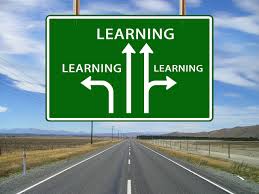 Much attention is paid to what we learn. We test for content acquisition and toast our subject matter experts.
Much attention is paid to what we learn. We test for content acquisition and toast our subject matter experts.
Make no mistake – content certainly matters. However, we live in a time where the “half-life” of knowledge is shrinking dramatically and “fake news” and “alt-facts” abound.
The ability to separate the “wheat from the chaff” and make sense of overwhelming and often contradictory data is key. The way we learn – our approach to the learning process – plays a key role in our ability to do that.
In our work, we focus attention on identifying and influencing the patterns that are a hallmark of complex systems like teams and organizations. In this post, we invite you to explore your patterns of learning.
 New language for discussing patterns will help. In the Complexity Space™ Framework (CSF) we introduce four “Dimensions” of organizational ecosystems: History, Context, Culture, and Motivation. Consider each of these in the context of your past and present approach to learning. Questions you might ask yourself include:
New language for discussing patterns will help. In the Complexity Space™ Framework (CSF) we introduce four “Dimensions” of organizational ecosystems: History, Context, Culture, and Motivation. Consider each of these in the context of your past and present approach to learning. Questions you might ask yourself include:
- How were you taught in your early years? How was that the “same or different” in high school and college? How are you being taught now?
- How big were the classes? Who were the people in class with you? How diverse were they? How are classes and shared learning structured now?
- How did you interact with the teacher/professor/instructor? Were you passively listening to lectures? Working in small groups? Participating in case studies and exercises? What is your engagement style now?
- Why were you there? Because K-12 state laws and professional requirements mandated you be there? To please your parents? Because you needed to be for your job? Because you wanted to? What is your motivation to learn today?
Note the answers to these (and the other dozens of questions you might ponder) transcend any particular subject – they provide glimpses into your larger pattern of learning. If these patterns continue to work for you, great! With insight and knowledge of specific learning patterns, you can manage your learning experience to be sure those elements are present.
 What if those patterns are not working for you? Why not change something in your learning patterns to better meet your needs and preferences? In the CSF, we identify seven “Catalysts”; seven “moves you can make” to influence any set of patterns. They include conducting “intelligent experiments” with one or more of the Catalysts to begin changing some aspect or combination of how learning happens for you: 1) Connections; 2) Risk Taking; 3) Leadership; 4) Organizational Structures; 5) Systems; 6) Stories; and 7) Processes.
What if those patterns are not working for you? Why not change something in your learning patterns to better meet your needs and preferences? In the CSF, we identify seven “Catalysts”; seven “moves you can make” to influence any set of patterns. They include conducting “intelligent experiments” with one or more of the Catalysts to begin changing some aspect or combination of how learning happens for you: 1) Connections; 2) Risk Taking; 3) Leadership; 4) Organizational Structures; 5) Systems; 6) Stories; and 7) Processes.
Like the “Dimensions” we introduced earlier, digging into the more precise pattern-shifting language and actions of Catalysts might lead to the following kinds of explorations:
- Who am I currently learning with? Might I change my learning partners to be more like me? From a different profession or with a different skill set?
- How much am I pushing myself in the learning choices I make? Am I pushing myself? Putting myself in a position to succeed? Forcing myself into learning methods that I know don’t work well for me (e.g. self-paced learning)?
- What stories do I tell myself about learning? Do I moan and complain? Tell myself I’m too old, too dumb, too rusty, too lazy? What if I changed that self-talk?
- How do I approach the process of learning? Do I properly prepare? Take notes? Control my learning environment? Use appropriate time, project, and learning management tools for support?
Note the use of the word “explorations” in the first sentence of the prior paragraph. Part of the challenge of dealing with complex systems is that there are no “guaranteed” solutions when it comes to changing your learning patterns. Having said that, we are confident that being intentional about changing something that does not serve you, noticing the results, and deciding on the “next smart step” will allow new possibilities to emerge.
We end this post about learning with three of our favorite quotes:
- “If you do what you’ve always done, you’ll get what you’ve always got.”
- “Insanity is doing the same thing the same way and expecting a different result.”
- “There is no failure unless there is failure to learn.”
What did you learn from reading this today?
We hope you will share your stories, questions and even disagreements with our articles because that is the only way we can continue to make sure Complexity Works!



Leave A Comment